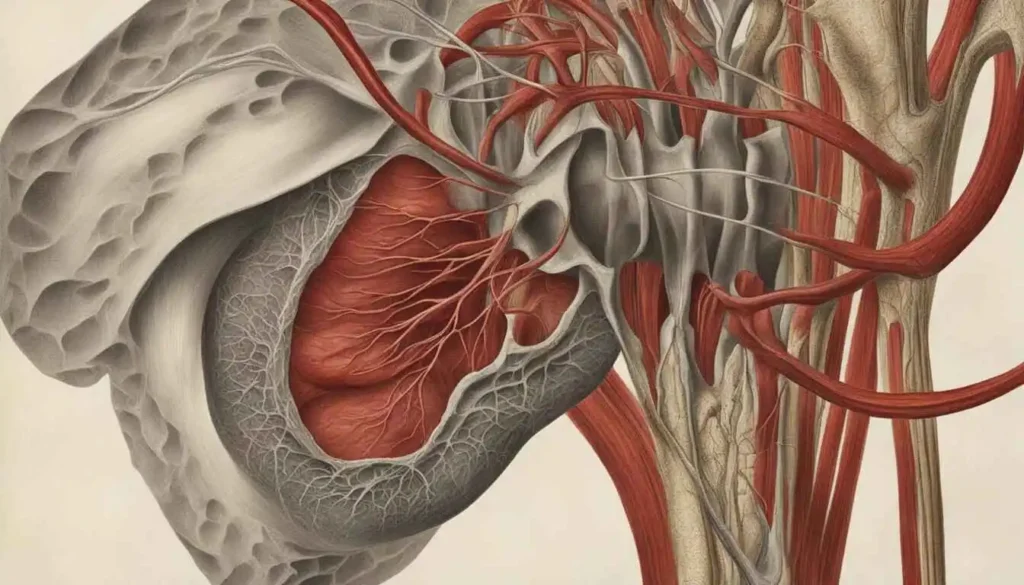Ever wondered, “what is a sperm cramp?” For men experiencing them, understanding sperm cramps can be quite frustrating as they’re not a formally recognized medical term. However, these cramps are commonly used to describe a range of lower abdominal or testicular discomforts that may be associated with your sperm production or ejaculation. Sperm cramps can be indicative of issues with the reproductive organs, targeting an area laden with societal stigma which might lead to underreporting or overlooking of this condition. Sperm cramps can be caused by various factors, such as prostatitis, epididymitis, varicocele, or even infrequent sexual activity leading to sperm buildup. Symptoms can range from a dull ache to intermittent sharp pelvic pains.
If you want to delve deeper into this matter, join me as we further explore sperm cramps and gain a clearer understanding of the discomfort that many men may be grappling with.
Key Takeaways
- Sperm cramps, despite not being a formal medical term, refer to lower abdominal or testicular discomfort related to sperm production or ejaculation.
- These cramps may be caused by factors such as prostatitis, epididymitis, varicocele, or infrequent sexual activity.
- Symptoms can range from a dull ache to intermittent sharp pelvic pains.
- Understanding sperm cramps involves thorough examination and potentially additional diagnostic tests.
- Effective treatments may include pain relievers, antibiotics, warm baths, and lifestyle adjustments such as supportive underwear and managing stress.
Demystifying Sperm Cramps: Symptoms and Identifying Signs
Sperm cramps can have various symptoms, ranging from a dull ache to sharp cramp-like pain in the testicular area or lower abdomen. Some men may notice a pattern in their discomfort’s frequency and duration, while others may only occasionally experience pain. Understanding the different symptoms and recognizing possible links between sperm cramps and ejaculation can help individuals better manage or seek treatment for this condition.
From Dull Ache to Sharp Pains: The Range of Sperm Cramp Discomfort
Symptoms of sperm cramps can vary widely, with some individuals experiencing a dull, aching discomfort while others may feel an intermittent, sharp cramp-like pain. The level of discomfort depends on factors such as individual physiology, underlying causes, and associated conditions. Testicular pain or discomfort can be linked to sperm production, whereas abdominal pain might be more closely related to the mechanics of ejaculation.
Frequency and Duration: Recognizing Patterns in Sperm Cramps
The frequency and duration of sperm cramps can differ significantly from one person to another. Some individuals may only experience pain sporadically, while others may notice a pattern of recurring discomfort. Pain can last anywhere from a few hours to several days, with some people experiencing cramps as often as twice a month or more. Recognizing patterns in sperm cramps and becoming aware of the conditions under which they occur can be key to managing or seeking treatment for this condition.
| Frequency | Duration |
|---|---|
| Sporadic | A few hours |
| Twice a month or more | Several days |
The Links Between Sperm Cramps and Ejaculation
Many men report experiencing sperm cramps during or after ejaculating, suggesting a strong correlation between sperm cramps and ejaculation. The exact cause of this relationship remains unclear, but it is thought that the mechanics of ejaculation or sperm production pain might play a role in triggering the onset of discomfort. Further research is needed to better understand the link between sperm cramps and ejaculation, ultimately helping those affected manage their symptoms more effectively.
Possible Underlying Causes for Sperm Cramps

Several factors contribute to sperm cramps, and it is essential to consider the possible underlying causes to address and alleviate the symptoms effectively. Understanding the role of sexual activity, prostate and testicular conditions, and vascular health is crucial for maintaining optimal male reproductive well-being.
Unpacking the Role of Sexual Activity and Abstinence
Both vigorous sexual activity and prolonged sexual inactivity can contribute to sperm cramp-like discomfort. Engaging in intense sexual encounters may lead to muscle tension in the pelvic area, resulting in cramps. On the other hand, extended periods of abstinence can cause sperm to build up and create congestion within the reproductive tract, leading to discomfort and pain.
Prostate and Testicular Conditions: A Closer Look
Several medical conditions can impact the prostate gland and testicles, potentially causing sperm cramps. For instance, prostatitis (inflammation of the prostate), varicocele (swollen veins in the scrotum), and epididymitis (inflammation of the epididymis) may result in cramp-like pain. All these conditions require professional medical assistance for proper diagnosis and treatment.
Exploring Vascular Health and Its Impact on Sperm Cramps
Vascular health plays a significant role in maintaining proper blood flow to the reproductive organs. Compromised vascular conditions, such as varicocele, can lead to swelling in the veins that drain the testicle, potentially causing pain and cramps associated with sperm congestion. Improving vascular health through lifestyle adjustments and medical interventions can alleviate sperm cramp discomfort and promote better reproductive well-being.
When to Seek Medical Attention for Sperm Cramps
If you are experiencing recurring, persistent, or severe abdominal pain and testicular discomfort, it is essential to seek medical help from a qualified healthcare professional. While it may be tempting to self-diagnose and treat these symptoms at home, it is important to remember that a proper medical evaluation is key to uncovering the underlying cause and ensuring an appropriate treatment plan is put in place.
Don’t let embarrassment or hesitation stop you from seeking help. Your reproductive health is important, and a healthcare professional can provide the guidance and support you need to overcome sperm cramps.
There are certain situations where it becomes particularly critical to consult a medical practitioner without delay. For instance, if you experience any of the following symptoms alongside your sperm cramps, it’s imperative to schedule an appointment with a healthcare professional promptly:
- Fever
- Swelling or redness in the affected area
- Persistent pain that doesn’t improve with over-the-counter pain relief medication
- Discomfort that significantly impacts your daily activities or quality of life
- Blood in the urine or semen
By seeking professional help early on, you can rule out the possibility of serious medical conditions and ensure that you receive appropriate treatment and guidance for managing your sperm cramps. Remember that early intervention is crucial in improving your reproductive health and overall well-being.
Effective Treatment Options for Alleviating Sperm Cramps

For those experiencing sperm cramps, relief can come in a variety of forms. Depending on the underlying cause, various treatments may be recommended to alleviate discomfort and improve reproductive health. In this section, we will explore some of the best approaches, including medications, natural remedies, and lifestyle adjustments.
Roles of Medication and Natural Remedies
In cases where sperm cramps stem from bacterial infections, a course of antibiotics is typically prescribed to fight the infection and reduce inflammation. Over-the-counter pain relievers can also help with managing the discomfort associated with sperm cramps.
For milder cases, natural remedies such as warm baths can provide immediate relief by relaxing the muscles and promoting better blood flow to the affected area. Many individuals opt for natural remedies to support their overall reproductive health and address sperm cramps before they become more severe.
Read Also: What Does NFS Mean on Wizz
Lifestyle Adjustments and Techniques for Prevention
Several lifestyle changes can be implemented to prevent sperm cramps and support reproductive health:
- Supportive underwear: Wearing well-fitted, supportive underwear can help alleviate discomfort and improve sperm cramp management.
- Managing stress: High levels of stress can have a negative effect on reproductive health, making it essential to find healthy ways to manage stress through exercise, relaxation techniques, or therapy.
- Staying hydrated: Proper hydration is vital for overall wellbeing, as well as for maintaining a healthy reproductive system. Drinking plenty of water and limiting caffeine or alcohol intake is crucial.
- Maintaining a balanced diet: Consuming nutrient-dense foods not only promotes general health, but it also supports reproductive functions. Eating a variety of fruits, vegetables, lean proteins, whole grains, and healthy fats can help create a well-rounded, sperm-cramp-fighting diet.
Additionally, regular ejaculation – either through intercourse or masturbation – can help alleviate potential discomfort and reduce the risk of sperm buildup that can lead to cramps.
Consulting Healthcare Professionals: What to Expect
Lastly, consulting healthcare professionals is a crucial step when dealing with sperm cramps. A thorough examination, along with a review of medical history and assessment of symptoms, can help determine the most suitable treatment plan. In some cases, additional diagnostic tests, such as ultrasounds or MRIs, may be necessary to pinpoint the exact cause of discomfort.
Remember, open conversation and proactive engagement with healthcare providers can make a significant difference in managing sperm cramps and improving overall reproductive health.
Conclusion
When it comes to discussing sperm cramps, it’s crucial that we normalize these conversations to foster better understanding and overall improvement in male reproductive health. By engaging in open dialogues about such conditions, we can raise awareness, promote early diagnosis, and ensure effective treatment for those affected.
While not everyone may be familiar with terms such as “urge delivery” on shopping websites or “NFS” in the context of travel, it’s vital to break the silence surrounding matters of men’s health. This includes addressing subjects like sperm cramps, which, though not widely talked about, can significantly impact a man’s well-being.
By seeking medical advice and adopting lifestyle changes as necessary, individuals can work towards mitigating the impact of sperm cramps on their lives. Moreover, understanding the various factors at play—such as equity financing—can provide invaluable insights for men navigating these issues. Remember, open discussion creates the foundation for promoting better reproductive health and better quality of life.
FAQ
What is a sperm cramp?
A sperm cramp is an informal term used to describe lower abdominal or testicular discomfort in men that may be associated with sperm production or ejaculation. Symptoms can vary from a dull ache to intermittent sharp pains, and the condition can have multiple underlying causes such as prostatitis, varicocele, epididymitis, or infrequent sexual activity leading to sperm buildup.
What are the symptoms of sperm cramps?
Symptoms of sperm cramps can range from a dull ache to sharp cramp-like pain, and may be experienced in the testicles or lower abdomen. The frequency and duration of these discomforts can vary, sometimes occurring sporadically or following a regular pattern. Some men may experience these pains during or after ejaculation.
What causes sperm cramps?
The causes of sperm cramps can include vigorous sexual activity, prolonged sexual inactivity, and medical conditions affecting the prostate gland or testicles such as prostatitis, varicocele, and epididymitis. Vascular health may also play a role as poor blood flow can lead to conditions like varicocele, contributing to pain and discomfort.
When should I seek medical attention for sperm cramps?
It is recommended to consult a healthcare professional if you experience recurring, persistent, or intense pain in the testicles or lower abdomen. Symptoms that accompany fever, swelling, or hinder daily activities should also prompt an immediate medical evaluation to rule out serious conditions.
How are sperm cramps treated?
Treatments for sperm cramps depend on the underlying cause, and may include medications like pain relievers and antibiotics, as well as warm baths for immediate relief. Lifestyle adjustments such as wearing supportive underwear, managing stress, and maintaining a balanced diet can also help prevent sperm cramps. Consulting a healthcare professional is crucial for a personalized approach to treatment.
How can I prevent sperm cramps?
To prevent sperm cramps, try adopting lifestyle changes such as wearing supportive underwear, staying hydrated, managing stress, and maintaining a balanced diet. Regular ejaculation and addressing emotional concerns are also recommended to alleviate potential discomfort. Consult a healthcare professional for personalized advice tailored to your specific needs.





